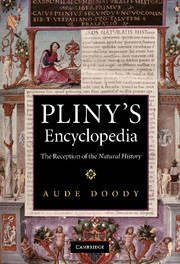Book contents
- Frontmatter
- Contents
- Acknowledgements
- Note on the text
- Introduction: how to read an encyclopedia
- 1 Science and encyclopedism: the originality of the Natural History
- 2 Diderot's Pliny and the politics of the encyclopedia
- 3 Finding facts: the summarium in the early printed editions
- 4 Specialist readings: art and medicine from the Natural History
- Conclusion: changing approaches to Pliny's Natural History
- Bibliography
- Index
- References
1 - Science and encyclopedism: the originality of the Natural History
Published online by Cambridge University Press: 04 May 2010
- Frontmatter
- Contents
- Acknowledgements
- Note on the text
- Introduction: how to read an encyclopedia
- 1 Science and encyclopedism: the originality of the Natural History
- 2 Diderot's Pliny and the politics of the encyclopedia
- 3 Finding facts: the summarium in the early printed editions
- 4 Specialist readings: art and medicine from the Natural History
- Conclusion: changing approaches to Pliny's Natural History
- Bibliography
- Index
- References
Summary
Pliny's Natural History is a peculiar book. The scope of its subject matter and the strangeness of its organising principles are almost unique in surviving Latin literature. But despite its apparent singularity, and despite Pliny's rhetorical insistence on its originality in his preface, there has been very little speculation as to where the Natural History might fit in the landscape of Roman historia. This is partly the result of the traditional marginality of ancient scholarship to Classical studies, but the lack of speculation about the provenance of the Natural History is in large part due to its self-evident but anachronistic recognition as ‘an encyclopedia’. The form and content of the Natural History have been naturalised as markers of an encyclopedic text; it is commonly called ‘an encyclopedia’ within the field of Classics, and maintains an important position in any attempt to trace the history of encyclopedism into antiquity.
Genre has a diffuse influence on the expectations which we bring to the text, and the methods of reading we apply to it. It provides an important framework for understanding the terms on which we should approach the work, suggesting a context for its production or performance and parameters for its content and conclusions. But once we move outside the well-policed genres of ‘high literature’, we can run into difficulties. There has been much debate as to how particular branches of historia demarcate their boundaries; these new studies have been concerned to examine the interactions between different types of prose writing, to discover the disjunctions and continuities between fiction and non-fiction, biography, and history, rhetoric and philosophy.
- Type
- Chapter
- Information
- Pliny's EncyclopediaThe Reception of the Natural History, pp. 11 - 39Publisher: Cambridge University PressPrint publication year: 2010



